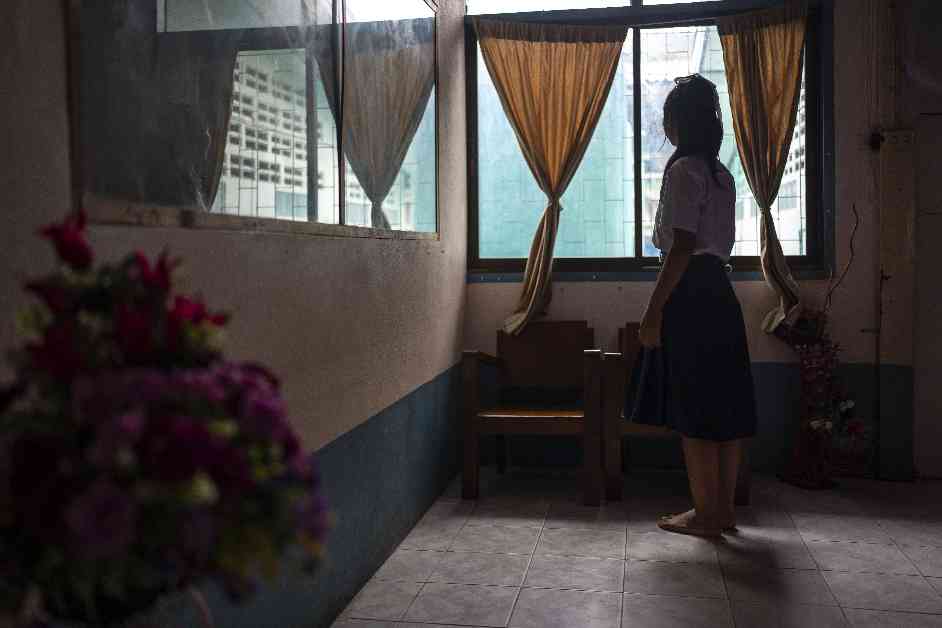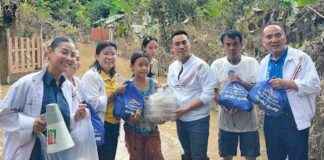Mobile Registration Unit: Restoring Dignity to Stateless Children- Life in the Shadows
In Thailand, there are currently over one hundred thousand children living in the shadows, lacking official recognition and access to basic rights. These stateless children, often referred to as “G Code children,” are only granted the right to education by the government. However, they are denied access to other essential services because they lack citizenship status.
Journey to Mae Ai
Located over 180 kilometers from Chiang Mai, Mae Ai district is a rural area bordering a neighboring country. In the early morning hours, the small school grounds are filled with the sounds of children playing, mingling with the gentle patter of rain. As the national anthem plays, more children join the procession into the school building. Some wear white school uniforms, others sport athletic attire, and a few don traditional clothing. They all hurry inside to escape the rain.
Inside the school, around 580 students from various ethnic groups, including Thai nationals, learn according to the basic education curriculum. These students, regardless of their background, have the right to access state-provided education services, as mandated by the Education Act of 2005. However, for the “G Code children” among them, this right is the only one they receive from the government.
Challenges Faced by Stateless Children
For children like Nid, a 15-year-old girl, being stateless poses numerous challenges, especially when it comes to accessing healthcare. Nid’s parents are part of an ethnic group living and working in the agricultural sector in Thailand. Due to her undocumented birth and her parents’ lack of official identification, Nid has never had a presence in any of the government’s registration systems.
As Nid navigates her daily life, she is confined to the district area due to her lack of official recognition. While she can travel outside the district, she must obtain a school certificate for necessary reasons, such as competitions or educational trips, to avoid potential complications. Her world is limited to her home, school, mountains, and the surrounding areas of a few districts in Chiang Mai province.
Dreams and Limitations
Despite her limitations, Nid dreams of becoming a teacher. However, her stateless status makes this aspiration seem unattainable. Without the financial means to pursue higher education or the ability to apply for a teaching position due to her lack of legal identity, Nid’s dreams may remain just that – dreams.
The Road to Recognition
The process of registering “G Code children” is the first step in addressing the issue of stateless individuals. The Thai government has implemented a system to assign codes to individuals without legal identity to certify their presence in schools. While this measure facilitates budget allocation for education and school meal programs, it does not equate to citizenship status.
To obtain additional rights from the Thai government, such as healthcare benefits or the ability to apply for citizenship in the future, further verification processes are required. This includes obtaining a “Center Card” or an identification card for individuals without legal status. To qualify, children must be born in Thailand, have permanent residence in the country, and meet specific criteria for healthcare access and travel restrictions.
Challenges in Registration Process
Despite efforts to address the issue of statelessness and provide basic rights to “G Code children,” progress has been slow. Challenges in the registration process, such as discrepancies in data collection and bureaucratic delays, have hindered the timely issuance of recognition cards. Some children have been left in limbo, waiting for their legal status to be confirmed.
In response to these challenges, a collaborative effort between local schools, government agencies, and community organizations has been initiated to streamline the registration process. This initiative aims to expedite the registration and development of legal identities for stateless children in the northern region of Thailand, where a significant number of “G Code children” reside.
Impact of Government Support
In 2024, with the support of the European Union and UNICEF, the Thai government launched a project to improve the registration process and enhance the status of stateless individuals. This initiative involved local schools, grassroots organizations, and civil society in efforts to register and develop legal identities for stateless children in the northern region of Thailand.
The implementation of this project has shown promising results in addressing the challenges faced by “G Code children” and improving their access to basic rights. By working together to streamline the registration process and provide support to government officials and child protection agencies, significant progress has been made in rectifying the status of stateless children.
Looking Ahead
Despite the strides made in addressing the issue of statelessness in Thailand, there are still tens of thousands of children awaiting recognition and access to essential services. The ongoing efforts to streamline the registration process and provide legal identities for stateless individuals are crucial in ensuring that all children have the opportunity to thrive and access their fundamental rights.
As the government continues to prioritize the rights and well-being of stateless children, it is essential to maintain momentum in addressing the challenges faced by this vulnerable population. By working collaboratively with schools, community organizations, and government agencies, Thailand can make significant strides in restoring dignity and providing essential services to stateless children, paving the way for a brighter future for all.




















